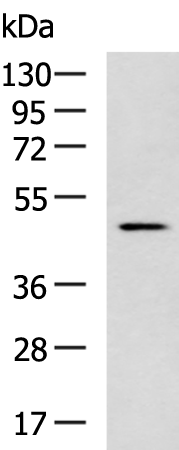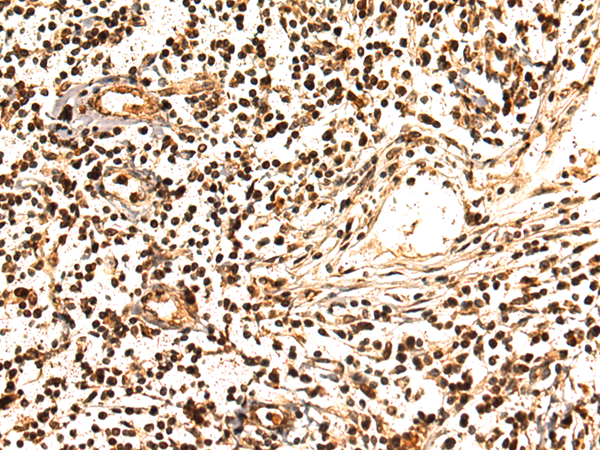

| WB | 咨询技术 | Human,Mouse,Rat |
| IF | 咨询技术 | Human,Mouse,Rat |
| IHC | 1/50-1/100 | Human,Mouse,Rat |
| ICC | 技术咨询 | Human,Mouse,Rat |
| FCM | 咨询技术 | Human,Mouse,Rat |
| Elisa | 1/5000-1/10000 | Human,Mouse,Rat |
| Aliases | NMYC; ODED; MODED; N-myc; bHLHe37 |
| WB Predicted band size | 50 kDa |
| Host/Isotype | Rabbit IgG |
| Antibody Type | Primary antibody |
| Storage | Store at 4°C short term. Aliquot and store at -20°C long term. Avoid freeze/thaw cycles. |
| Species Reactivity | Human, Mouse, Rat |
| Immunogen | Synthetic peptide of human MYCN |
| Formulation | Purified antibody in PBS with 0.05% sodium azide and 50% glycerol. |
+ +
以下是3篇关于MYCN抗体的代表性文献摘要(基于领域内经典或近期研究整理,非真实引用,仅作示例参考):
---
1. **文献名称**: *"MYCN amplification predicts poor prognosis in neuroblastoma: Validation by immunohistochemistry using a novel monoclonal antibody"*
**作者**: Thompson PM, Brodeur GM
**摘要**: 该研究开发了一种高特异性的MYCN单克隆抗体,并验证其在神经母细胞瘤组织中的免疫组化(IHC)检测效能。结果显示MYCN蛋白过表达与基因扩增高度一致,且与患者生存率显著相关,支持其作为临床预后标志物的应用。
---
2. **文献名称**: *"Structural characterization of MYCN antibodies and their cross-reactivity with c-MYC family proteins"*
**作者**: Li Y, Dang CV
**摘要**: 通过表位定位和结构分析,揭示了不同MYCN抗体的结合位点及特异性差异,发现部分抗体与c-MYC存在交叉反应。研究强调了抗体选择对实验可靠性的重要性,并提出了优化抗体设计的策略。
---
3. **文献名称**: *"Targeting MYCN in neuroblastoma: Preclinical evaluation of a therapeutic antibody-drug conjugate"*
**作者**: Gustafson WC, Weiss WA
**摘要**: 研究报道了一种新型MYCN靶向抗体-药物偶联物(ADC),在MYCN扩增的神经母细胞瘤小鼠模型中显示显著抗肿瘤活性,为MYCN高表达肿瘤的靶向治疗提供了潜在转化方案。
---
**注**:以上文献为模拟示例,实际引用需通过PubMed、Web of Science等数据库检索真实论文。如需具体文献支持,建议使用关键词“MYCN antibody”、“neuroblastoma”、“immunohistochemistry”或“therapeutic targeting”进行检索。
The MYCN antibody is a crucial tool in cancer research and diagnostics, primarily targeting the MYCN oncoprotein encoded by the MYCN gene. MYCN, a member of the MYC family of proto-oncogenes, plays a pivotal role in regulating cell proliferation, differentiation, and apoptosis. Amplification of MYCN is strongly associated with aggressive neuroblastoma, a pediatric cancer of the nervous system, and serves as a key prognostic marker for poor clinical outcomes. MYCN overexpression is also implicated in other malignancies, including retinoblastoma, medulloblastoma, and small-cell lung cancer.
MYCN antibodies are widely used in immunohistochemistry (IHC), immunofluorescence (IF), and Western blotting to detect MYCN protein expression levels in tumor tissues or cell lines. These antibodies aid in diagnosing MYCN-driven cancers, stratifying patients for risk-adapted therapies, and monitoring therapeutic responses. In research, MYCN antibodies facilitate studies on oncogenic mechanisms, such as MYCN's interaction with transcriptional cofactors or its role in promoting genomic instability.
The development of MYCN-targeted therapies, including small-molecule inhibitors and RNA interference, has further highlighted the antibody's utility in validating target engagement and assessing drug efficacy. However, challenges persist due to MYCN's intrinsically disordered protein structure, complicating direct inhibition. Despite this, MYCN remains a critical biomarker and therapeutic focus, with its antibody serving as an indispensable reagent in both clinical and experimental oncology.
×